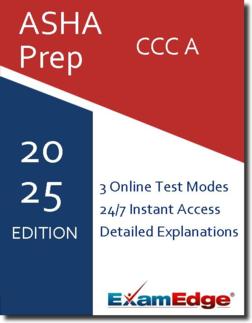ASHA CCC-A (CCC-A) Practice Tests & Test Prep by Exam Edge - FAQ
Based on 29 Reviews
- Real Exam Simulation: Timed questions and matching content build comfort for your ASHA CCC-A test day.
- Instant, 24/7 Access: Web-based ASHA Clinical Competence in Audiology practice exams with no software needed.
- Clear Explanations: Step-by-step answers and explanations for your ASHA exam to strengthen understanding.
- Boosted Confidence: Reduces anxiety and improves test-taking skills to ace your ASHA Clinical Competence in Audiology (CCC-A).

Why should I use Exam Edge to prepare for the ASHA Clinical Competence in Audiology Exam?
FAQ's for Exam Edge ASHA Clinical Competence in Audiology practice tests
- Comprehensive content: Exam Edge's ASHA Clinical Competence in Audiology practice tests are created specifically to prepare you for the real exam. All our ASHA CCC-A practice test questions parallel the topics covered on the real test. The topics themselves are covered in the same proportions as the real test too, based on outlines provided by the American Speech-Language-Hearing Association in their ASHA CCC-A test guidelines.
- Realistic practice: Our ASHA CCC-A practice exams are designed to help familiarize you with the real test. With the same time limits as the real exam, Our ASHA practice tests enable you to practice your pacing and time management ahead of test day.
- Detailed explanations: As you complete your practice tests, we show you which questions you answered correctly and which ones you answered incorrectly, in addition to providing you with detailed step-by-step explanations for every single ASHA Clinical Competence in Audiology practice exam question.
- Performance insights: After you complete a practice test, we provide you with your raw score (how many you answered correctly) and our estimate of the ASHA CCC-A score you would have received if you had taken the real test.
- Ease of access: Because all Our ASHA practice tests are web-based, there is no software to install. You can take ASHA CCC-A practice exams on any device with access to the internet, at any time.
- Flexible use: If you must pause while taking one of Our ASHA practice exam, you can continue right where you left off. When you continue the test, you will start exactly where you were, and with the same amount of time you had remaining.
- Thousands of unique questions: We offer 5 different online practice exams with 600 unique questions to help you prepare for your ASHA Clinical Competence in Audiology!
- Low cost: The cost of ordering 5 practice tests is less than the cost of taking the real ASHA CCC-A test. In other words, it would be less expensive to order 5 practice tests than to retake the real ASHA Clinical Competence in Audiology exam!
- Our trusted reputation: As a fully accredited member of the Better Business Bureau, we uphold the highest level of business standards. You can rest assured that we maintain all of the BBB Standards for Trust.
- Additional support: If you need additional help, we offer specialized tutoring. Our tutors are trained to help prepare you for success on the ASHA Clinical Competence in Audiology exam.
What score do I need to pass the ASHA CCC-A Exam?
To pass the ASHA Clinical Competence in Audiology test you need a score of .
The range of possible scores is 100 to 200.
How do I know the practice tests are reflective of the actual ASHA Clinical Competence in Audiology?
At Exam Edge, we are proud to invest time and effort to make sure that Our ASHA practice tests are as realistic as possible. Our practice tests help you prepare by replicating key qualities of the real test, including:
- The topics covered
- The level of difficulty
- The maximum time-limit
- The look and feel of navigating the exam
Do you offer practice tests for other American Speech-Language-Hearing Association subjects?
Yes! We offer practice tests for 3 different exam subjects, and there are 35 unique exams utilizing 4200 practice exam questions. Every subject has a free sample practice test you can try too!
CCC Speech-Language Pathology (CCC-SLP)
Practice Tests
ASHA Clinical Competence in Audiology (CCC-A)
Practice Tests
ASHA Speech-Language Pathology (ASHA)
Practice Tests
To order full-length tests, or take a sample test, for a different subject:
Click on ' Name on the Exam Name' You will be take to the orders page
How do I register for the real American Speech-Language-Hearing Association?
For up-to-date information about registration for the American Speech-Language-Hearing Association, refer to the American Speech-Language-Hearing Association website.


